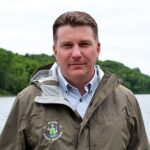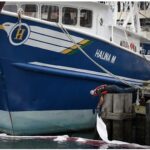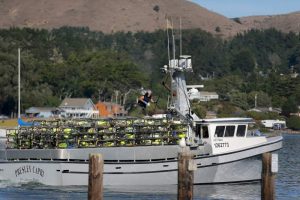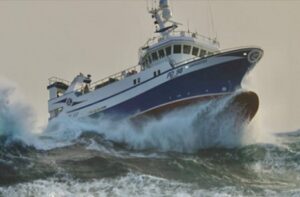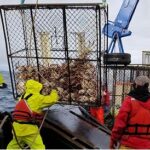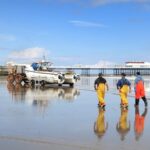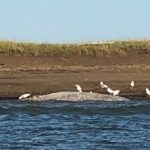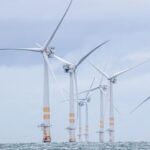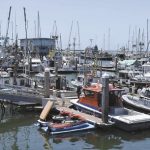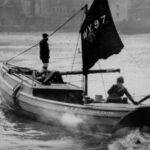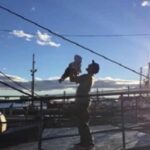Monthly Archives: September 2016
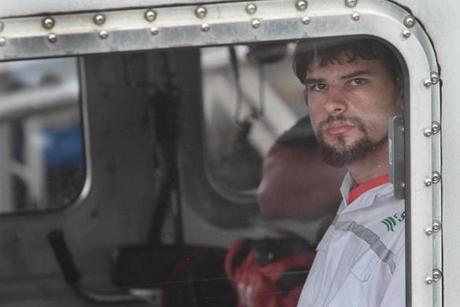
Records show man rescued at sea was slay suspect
Court records show that a Vermont man who spent a week on a life raft in the Atlantic Ocean before he was rescued recently was a suspect in the unsolved 2013 killing of his grandfather in Connecticut. Nathan Carman, of Vernon, Vermont, was rescued Sunday. His mother, Linda Carman, of Middletown, Connecticut, is still missing and presumed dead. Nathan Carmen told the Coast Guard he and his mother were on his fishing boat when it sank. Documents obtained by The Hartford Courant show that Nathan Carman was investigated in the fatal shooting of 87-year-old John Chakalos. According to a search warrant, Carman was the last person known to see his grandfather alive on Dec. 20, 2013, because he had dinner with him at his home in Windsor, Connecticut. Chakalos was found dead the next morning. Read more here 18:59
Scottish fishermen fear they will lose out after voting for Brexit
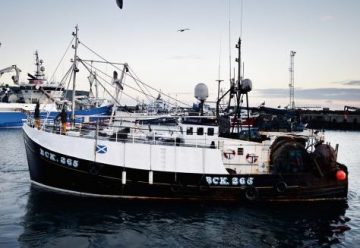 James Stevens has spent 37 years fishing out of Peterhead. When he began, some 450 boats frequently filled the granite harbour on Scotland’s rugged northeast coast. Today only about 100 trawlers regularly leave Peterhead to ply their trade in the North Sea. Like almost everyone in Peterhead, Stevens blames the European Union – and particularly the unpopular common fisheries policy – for his industry’s decline. In June, the skipper of the Harvest Hope voted for Brexit “for my children and my grandchildren”. Stevens is “chuffed” that the UK will be leaving the EU, but his pleasure is tinged with a note of concern. He is worried that fishing could become a bargaining chip for both the UK and Scottish governments during the Brexit negotiations. “There is concern that we will be sold down the river again by government,” says fisherman Peter Bruce. He would like to see article 50 – the mechanism to trigger Britain’s formal exit talks with the EU – invoked quickly but that is unlikely. Read the story here 17:27
James Stevens has spent 37 years fishing out of Peterhead. When he began, some 450 boats frequently filled the granite harbour on Scotland’s rugged northeast coast. Today only about 100 trawlers regularly leave Peterhead to ply their trade in the North Sea. Like almost everyone in Peterhead, Stevens blames the European Union – and particularly the unpopular common fisheries policy – for his industry’s decline. In June, the skipper of the Harvest Hope voted for Brexit “for my children and my grandchildren”. Stevens is “chuffed” that the UK will be leaving the EU, but his pleasure is tinged with a note of concern. He is worried that fishing could become a bargaining chip for both the UK and Scottish governments during the Brexit negotiations. “There is concern that we will be sold down the river again by government,” says fisherman Peter Bruce. He would like to see article 50 – the mechanism to trigger Britain’s formal exit talks with the EU – invoked quickly but that is unlikely. Read the story here 17:27
Maine lobstermen’s group weighs in on death of entangled whale
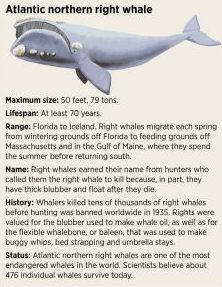 There are signs the ropes were from fishing gear not used for lobstering, an official says, as others discuss regulations that protect the endangered animal. The death of a 45-ton right whale found entangled in fishing line about 12 miles off the Maine coast over the weekend has caught the attention of the Maine lobster industry even though it’s not clear whether the whale’s demise was related to lobster fishing. The right whale is endangered and protected by the federal government. Patrice McCarron, executive director of the Maine Lobstermen’s Association, said preliminary indications appear to show that the ropes found on the whale were much larger than those typically used by lobstermen. The larger ropes would instead more often be found in deep-sea fishing, she said. Read the story here 17:18
There are signs the ropes were from fishing gear not used for lobstering, an official says, as others discuss regulations that protect the endangered animal. The death of a 45-ton right whale found entangled in fishing line about 12 miles off the Maine coast over the weekend has caught the attention of the Maine lobster industry even though it’s not clear whether the whale’s demise was related to lobster fishing. The right whale is endangered and protected by the federal government. Patrice McCarron, executive director of the Maine Lobstermen’s Association, said preliminary indications appear to show that the ropes found on the whale were much larger than those typically used by lobstermen. The larger ropes would instead more often be found in deep-sea fishing, she said. Read the story here 17:18
NMFS Announces Proposed Rule to Protect Deep-Sea Corals in the Mid-Atlantic
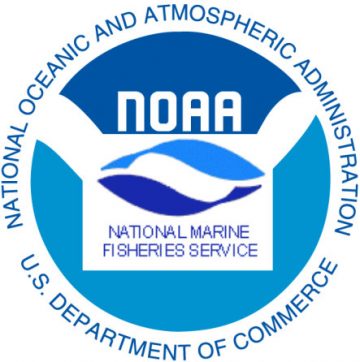 On September 26, 2016, NOAA Fisheries announced a proposed rule to designate a deep-sea coral protection area in the Mid-Atlantic. The area extends from the continental shelf/slope break off the Mid-Atlantic states (New York to North Carolina) to the border of the Exclusive Economic Zone. If finalized, this proposed rule would be the first nationally to protect deep-sea corals under the new deep sea coral discretionary provisions of the Magnuson-Stevens Fishery Conservation and Management Act. The public has until November 1 to comment on this proposed rule, either online or by mail. It should be noted that 11 years ago, the New England Fishery Management Council used the essential fish habitat provisions of the Magnuson-Stevens Act to protect deep-sea corals located in two offshore canyon areas (Lydonia and Oceanographer) through an amendment to the Monkfish Fishery Management Plan. “This would protect 15 deep-sea canyons in a total area of about 24 million acres, about the size of Virginia, or about 20 times the size of the Grand Canyon National Park,” said John Bullard, regional administrator for NOAA Fisheries Greater Atlantic Region. Read the Proposed rule, request for comments here 17:01
On September 26, 2016, NOAA Fisheries announced a proposed rule to designate a deep-sea coral protection area in the Mid-Atlantic. The area extends from the continental shelf/slope break off the Mid-Atlantic states (New York to North Carolina) to the border of the Exclusive Economic Zone. If finalized, this proposed rule would be the first nationally to protect deep-sea corals under the new deep sea coral discretionary provisions of the Magnuson-Stevens Fishery Conservation and Management Act. The public has until November 1 to comment on this proposed rule, either online or by mail. It should be noted that 11 years ago, the New England Fishery Management Council used the essential fish habitat provisions of the Magnuson-Stevens Act to protect deep-sea corals located in two offshore canyon areas (Lydonia and Oceanographer) through an amendment to the Monkfish Fishery Management Plan. “This would protect 15 deep-sea canyons in a total area of about 24 million acres, about the size of Virginia, or about 20 times the size of the Grand Canyon National Park,” said John Bullard, regional administrator for NOAA Fisheries Greater Atlantic Region. Read the Proposed rule, request for comments here 17:01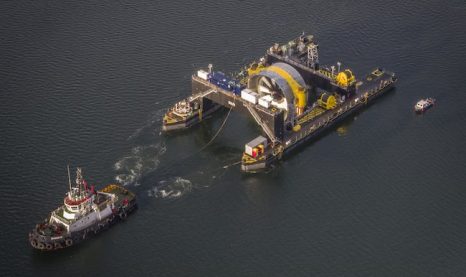
Fishermen looking to derail Bay of Fundy tidal project head to court
An ambitious plan to lower two massive turbines into the Bay of Fundy, where they will be tested against the awesome power of the world’s highest tides, has hit more legal turbulence. A group of Nova Scotia fishermen will seek a court order to suspend the Cape Sharp Tidal project until a judge can review the case early next year. The 175-member Bay of Fundy Inshore Fishermen’s Association confirmed Sept. 27 that it will head to court Oct. 20 to seek a stay of a June decision by Nova Scotia’s environment minister to approve the project’s test phase. “It’s is critically important,” spokesman Colin Sproul said in an interview. “If that turbine goes in the water in the Bay of Fundy (this fall) …. it will never be removed. That’s why it’s so critical for our case for the stay application to pass.” Read the story here 16:32
Nova Scotia’s ancient cold-water corals protected by fishing ban
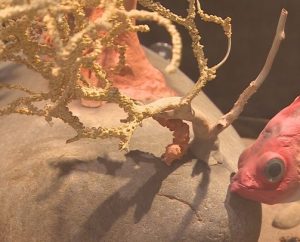 Fisheries and Oceans Canada says its decision to protect more than 9,000 square kilometres of ocean bottom off Nova Scotia will have a minimal impact on the province’s fishing industry and a major impact in saving ancient cold water corals. Canada is banning all forms of bottom fishing in two areas: Forty-nine square kilometres in the Jordan Basin 100 kilometres west of Nova Scotia, and Nine thousand square kilometres in two underwater canyons — Corsair and Georges canyons farther from the coast, by Georges Bank. The corals can live for 1,000 years. The protections are part of the federal government commitment to protect 10 per cent of Canada’s oceans by 2020. The change bans people from lobster and crab-trap fishing on the bottom, trawl dragging, using a gill net, and hook-and-line fishing that uses anchors. MacDonald said only seven lobster fishermen had catches in the Jordan Basin area closer to shore. Read the rest here 10:34
Fisheries and Oceans Canada says its decision to protect more than 9,000 square kilometres of ocean bottom off Nova Scotia will have a minimal impact on the province’s fishing industry and a major impact in saving ancient cold water corals. Canada is banning all forms of bottom fishing in two areas: Forty-nine square kilometres in the Jordan Basin 100 kilometres west of Nova Scotia, and Nine thousand square kilometres in two underwater canyons — Corsair and Georges canyons farther from the coast, by Georges Bank. The corals can live for 1,000 years. The protections are part of the federal government commitment to protect 10 per cent of Canada’s oceans by 2020. The change bans people from lobster and crab-trap fishing on the bottom, trawl dragging, using a gill net, and hook-and-line fishing that uses anchors. MacDonald said only seven lobster fishermen had catches in the Jordan Basin area closer to shore. Read the rest here 10:34
Annual Irish Groundfish Survey Now Under Way
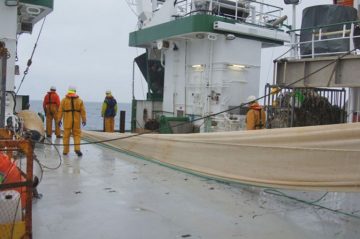 The Marine Institute’s annual Irish Groundfish Survey (IGFS2016) began off the North West Coast on Sunday 25 September, continuing till Thursday 6 October, in fulfilment of Ireland’s Common Fisheries Policy obligations. IGFS2016 is a demersal trawl survey consisting of a minimum of 45 fishing hauls each of 30 minutes’ duration. Fishing in 2016 is taking place within a two-nautical-mile radius of positions indicated in Marine Notice No 41 of 2016, available to read or download HERE. The survey is being conducted by the RV Celtic Explorer (Callsign EIGB), which will display all appropriate lights and signals throughout and is also listening on VHF Channel 16. The Celtic Explorer will be towing a high headline GOV 36/47 demersal trawl during fishing operations. The Marine Institute requests that commercial fishing and other marine operators keep a two-nautical-mile area around the tow points clear of any gear or apparatus during the survey period outlined above. Read the rest here 09:52
The Marine Institute’s annual Irish Groundfish Survey (IGFS2016) began off the North West Coast on Sunday 25 September, continuing till Thursday 6 October, in fulfilment of Ireland’s Common Fisheries Policy obligations. IGFS2016 is a demersal trawl survey consisting of a minimum of 45 fishing hauls each of 30 minutes’ duration. Fishing in 2016 is taking place within a two-nautical-mile radius of positions indicated in Marine Notice No 41 of 2016, available to read or download HERE. The survey is being conducted by the RV Celtic Explorer (Callsign EIGB), which will display all appropriate lights and signals throughout and is also listening on VHF Channel 16. The Celtic Explorer will be towing a high headline GOV 36/47 demersal trawl during fishing operations. The Marine Institute requests that commercial fishing and other marine operators keep a two-nautical-mile area around the tow points clear of any gear or apparatus during the survey period outlined above. Read the rest here 09:52
North Carolina Counties and fishermen’s associations file lawsuit over flounder supplement
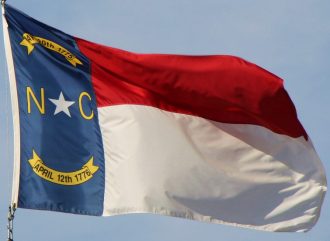 Several coastal counties have joined with commercial fishermen in litigation against the State of North Carolina regarding last year’s decision by the Marine Fisheries Commission to adopt new regulations on the southern flounder fishery by using the “Supplement” process. The complaint was filed on Sept. 23 in Carteret County Superior Civil Court in Beaufort. The plaintiffs include NCFA Inc., the Carteret County Fisherman’s Association Inc., Carteret County, Dare County and Hyde County. Defendants served with the complaint are the secretary of the N.C. Department of Environmental Quality, the director of the N.C. Division of Marine Fisheries and all members of the N.C. Marine Fisheries Commission. The practical effect of the litigation is to stop the closure of the recreational and commercial southern flounder fisheries, scheduled to take effect this fall. Read the story here 08:53
Several coastal counties have joined with commercial fishermen in litigation against the State of North Carolina regarding last year’s decision by the Marine Fisheries Commission to adopt new regulations on the southern flounder fishery by using the “Supplement” process. The complaint was filed on Sept. 23 in Carteret County Superior Civil Court in Beaufort. The plaintiffs include NCFA Inc., the Carteret County Fisherman’s Association Inc., Carteret County, Dare County and Hyde County. Defendants served with the complaint are the secretary of the N.C. Department of Environmental Quality, the director of the N.C. Division of Marine Fisheries and all members of the N.C. Marine Fisheries Commission. The practical effect of the litigation is to stop the closure of the recreational and commercial southern flounder fisheries, scheduled to take effect this fall. Read the story here 08:53
Lake Erie captain ordered to use GPS after pleading guilty to multiple counts under the Fisheries Act
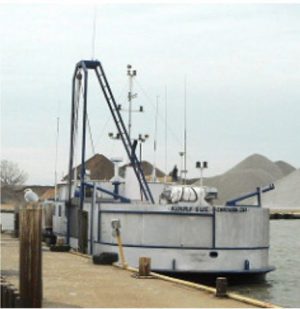 A Leamington commercial fishing boat captain with decades of sailing experience in Lake Erie has agreed to have his boat’s movements monitored by GPS during the next two years. Paolo Adragna, 50, pleaded guilty to multiple counts under the Fisheries Act in a Chatham court Monday, as part of a joint submission that he also pay $18,000 in fines and the family company, 149561 Ontario Limited, was assessed another $2,000 in fines for illegal fishing operations in 2015. Charges against the defendant’s elderly parents, who were jointly charged, were withdrawn. Crown attorney Demetrius Kappos said the defendant was the captain of the vessel Kimmy Sue and a director in the family business that holds two commercial food fishing licences to take fish from zones 1 and 2 in Lake Erie. Kappos said ministry staff conducted an inspection of the Kimmy Sue at the Port of Kingsville on Oct. 1, 2015 and found several trays containing undersized gill nets, a breach of a licensing condition. Read the story here 08:01
A Leamington commercial fishing boat captain with decades of sailing experience in Lake Erie has agreed to have his boat’s movements monitored by GPS during the next two years. Paolo Adragna, 50, pleaded guilty to multiple counts under the Fisheries Act in a Chatham court Monday, as part of a joint submission that he also pay $18,000 in fines and the family company, 149561 Ontario Limited, was assessed another $2,000 in fines for illegal fishing operations in 2015. Charges against the defendant’s elderly parents, who were jointly charged, were withdrawn. Crown attorney Demetrius Kappos said the defendant was the captain of the vessel Kimmy Sue and a director in the family business that holds two commercial food fishing licences to take fish from zones 1 and 2 in Lake Erie. Kappos said ministry staff conducted an inspection of the Kimmy Sue at the Port of Kingsville on Oct. 1, 2015 and found several trays containing undersized gill nets, a breach of a licensing condition. Read the story here 08:01
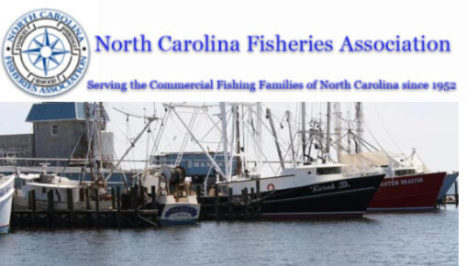
North Carolina Fisheries Association Weekly Update for September 26, 2016
Click here to read the Weekly Update, to read all the updates, Click here 19:18
NFL Hall-of-Famer Warren Sapp’s Tuna Thrill. He’s coming back to P.E.I for more!
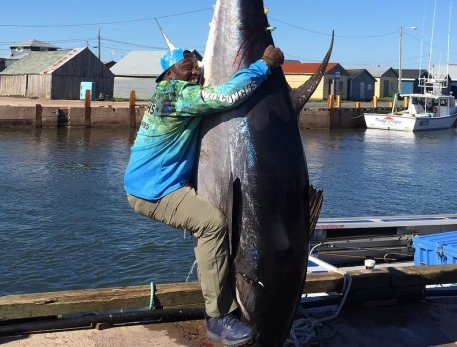 NFL Hall-of-Famer and former Super Bowl champion Warren Sapp appears to have enjoyed his trip to P.E.I., posting pictures of his tuna fishing excursion off North Lake to his Instagram account. More photos, Read the story here 17:46
NFL Hall-of-Famer and former Super Bowl champion Warren Sapp appears to have enjoyed his trip to P.E.I., posting pictures of his tuna fishing excursion off North Lake to his Instagram account. More photos, Read the story here 17:46
N.C. Man Pleads Guilty to Illegal Bass Fishing
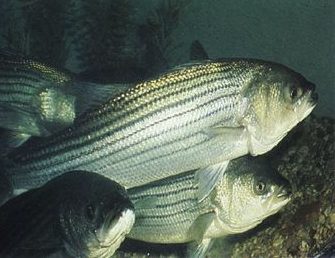 A North Carolina fisherman pleaded guilty Monday to the illegal harvest and sale of Atlantic striped bass in federal waters in 2010. The Justice Department said the charges against Dewey Willis Jr. of Newport, N.C., stemmed from an multi-defendant investigation involving 13 other commercial fishermen. As described in a written notice of Willis’s pleas, the National Oceanic and Atmospheric Administration received a tip regarding the fishermen’s alleged illegal activities involving striped bass, and directed the U.S. Coast Guard to board the fishing vessel Lady Samaira in February 2010. Willis and the other fishermen onboard were charged with violating the Lacey Act, a federal law that prohibits individuals from transporting, selling or buying fish and wildlife harvested illegally. Now that he was entered a guilty plea, Willis faces a maximum sentence of five years in prison and a $250,000 fine. Read the rest here 17:15
A North Carolina fisherman pleaded guilty Monday to the illegal harvest and sale of Atlantic striped bass in federal waters in 2010. The Justice Department said the charges against Dewey Willis Jr. of Newport, N.C., stemmed from an multi-defendant investigation involving 13 other commercial fishermen. As described in a written notice of Willis’s pleas, the National Oceanic and Atmospheric Administration received a tip regarding the fishermen’s alleged illegal activities involving striped bass, and directed the U.S. Coast Guard to board the fishing vessel Lady Samaira in February 2010. Willis and the other fishermen onboard were charged with violating the Lacey Act, a federal law that prohibits individuals from transporting, selling or buying fish and wildlife harvested illegally. Now that he was entered a guilty plea, Willis faces a maximum sentence of five years in prison and a $250,000 fine. Read the rest here 17:15
Burn the gillnets?
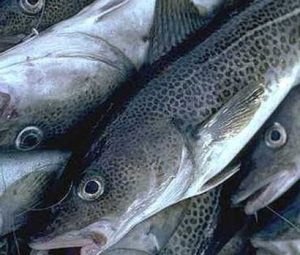 As we move ever closer to a revival of the commercial cod fishery, insiders say it’s essential the focus be on quality over quantity, and that means there may be no place for the controversial gillnet. That was one of the messages delivered Monday in St. John’s to members of the House of Commons Standing Committee on Fisheries and Oceans, and no one said it more forcefully than John Efford. “Take every gillnet in Newfoundland and have a bonfire,” Efford, a former provincial and federal politician with deep ties to the fishery, told the committee. The committee is studying the northern cod stock, and preparing for a day when the resource is once again healthy enough to sustain a large-scale commercial fishery. There’s different opinions on when that might be, but there appears to be unanimous support for a fishery that delivers premium quality products to the marketplace, therefore yielding the highest possible price for those who take part. Efford says there’s no place for gillnets in such a fishery because quality suffers, and the market will not tolerate it. Read the story here 16:16
As we move ever closer to a revival of the commercial cod fishery, insiders say it’s essential the focus be on quality over quantity, and that means there may be no place for the controversial gillnet. That was one of the messages delivered Monday in St. John’s to members of the House of Commons Standing Committee on Fisheries and Oceans, and no one said it more forcefully than John Efford. “Take every gillnet in Newfoundland and have a bonfire,” Efford, a former provincial and federal politician with deep ties to the fishery, told the committee. The committee is studying the northern cod stock, and preparing for a day when the resource is once again healthy enough to sustain a large-scale commercial fishery. There’s different opinions on when that might be, but there appears to be unanimous support for a fishery that delivers premium quality products to the marketplace, therefore yielding the highest possible price for those who take part. Efford says there’s no place for gillnets in such a fishery because quality suffers, and the market will not tolerate it. Read the story here 16:16
FISH-NL: Fish harvesters in Port de Grave curious to see what will come of a push to form alternative to the FFAW.
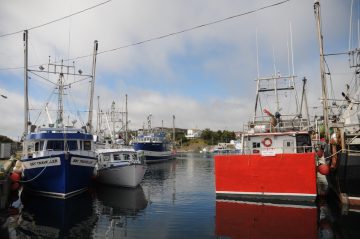 The union drive so far is getting some serious looks. Hundreds of harvesters attended meetings held last week in Corner Brook and Clarenville. Frustrations hinge on a variety of issues that have come up in the industry. One man on the wharf pointed to various fees in place and the exorbitant compensation for union management and staff. On the flipside of that, a pension for harvesters amounts to selling off their enterprise when they’re ready to leave the sea. Meanwhile, those who continue to harvest are finding it difficult to compete against boats owned by plant operators and even the union itself. There’s also some general dissatisfaction over cod licenses granting harvesters the right to catch 2,000-3,000 pounds per week. “Why would a 65-foot or a 70-foot boat go out and get that, and pay a crew? There’s nothing there to do it. And that’s what really stirred all this up, is when the cod fishery came out. People weren’t consulted about it. Two or three (people) higher up in the union come out with all this planning, and there’s no consultations done with fishers … Read the story here 13:30
The union drive so far is getting some serious looks. Hundreds of harvesters attended meetings held last week in Corner Brook and Clarenville. Frustrations hinge on a variety of issues that have come up in the industry. One man on the wharf pointed to various fees in place and the exorbitant compensation for union management and staff. On the flipside of that, a pension for harvesters amounts to selling off their enterprise when they’re ready to leave the sea. Meanwhile, those who continue to harvest are finding it difficult to compete against boats owned by plant operators and even the union itself. There’s also some general dissatisfaction over cod licenses granting harvesters the right to catch 2,000-3,000 pounds per week. “Why would a 65-foot or a 70-foot boat go out and get that, and pay a crew? There’s nothing there to do it. And that’s what really stirred all this up, is when the cod fishery came out. People weren’t consulted about it. Two or three (people) higher up in the union come out with all this planning, and there’s no consultations done with fishers … Read the story here 13:30
Five things Steve Crocker told the standing committee on fisheries and oceans
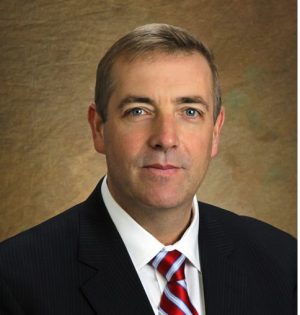 Provincial Fisheries, Forestry and Agrifoods Minister Steve Crocker appeared before the House of Commons Standing Committee on Fisheries and Oceans this morning at the Sheraton Hotel, St John’s. His presentation was part of the committee’s study on the northern cod stock, which stretches from the Grand Banks to the south coast of Labrador. Newfoundland and Labrador has an extremely small share of the current global cod market. Currently, the Newfoundland and Labrador cod fishery primarily produces single frozen fillets and portions in the form of loins and tails,,, The management of forage species such as caplin can be better integrated with the management objective for cod, and the impact of competitors and predators such as seals could also be considered,,, Read the rest here 13:11
Provincial Fisheries, Forestry and Agrifoods Minister Steve Crocker appeared before the House of Commons Standing Committee on Fisheries and Oceans this morning at the Sheraton Hotel, St John’s. His presentation was part of the committee’s study on the northern cod stock, which stretches from the Grand Banks to the south coast of Labrador. Newfoundland and Labrador has an extremely small share of the current global cod market. Currently, the Newfoundland and Labrador cod fishery primarily produces single frozen fillets and portions in the form of loins and tails,,, The management of forage species such as caplin can be better integrated with the management objective for cod, and the impact of competitors and predators such as seals could also be considered,,, Read the rest here 13:11
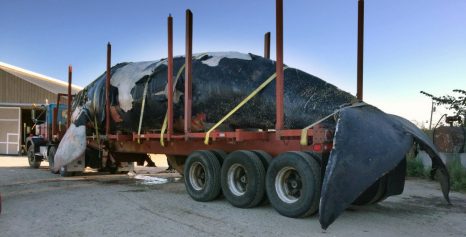
This 43-foot dead whale was trucked through downtown Portland
The National Oceanic and Atmospheric Administration is investigating how an endangered right whale found floating off the Maine coast Friday became entangled in fishing gear that probably caused its death. Jennifer Goebel, a spokeswoman for NOAA’s Greater Atlantic Region in Gloucester, Massachusetts, confirmed Sunday evening that fishing gear ropes were the most likely cause of the North Atlantic right whale’s demise. Goebel said NOAA will try to identify the gear’s owner, but she was uncertain whether punitive action would be taken. If the owner can be identified, NOAA could use the incident to raise public awareness and develop strategies for preventing future occurrences. Read the story here 12:33
Environmental group dislikes new rule for listing, delisting or reclassification under the Endangered Species Act
 The U.S. Fish and Wildlife Service and National Oceanic and Atmospheric Administration (NOAA) Fisheries finalized a rule Monday that changes the process by which species are petitioned for listing, delisting or reclassification under the Endangered Species Act (ESA). Under the rule, first proposed in May 2015, petitioners will be required to notify each state wildlife agency where a species is located at least 30 days before submitting a petition to the federal government. The delay will gives states an opportunity to provide agencies with pertinent information on the species. The new rule also restricts the number of species that can be petitioned for at one time. Under the rule, only one species is allowed per petition. The Center for Biological Diversity was quick to slam the rule, calling it an “impediment” to using the Endangered Species Act. “These new restrictions on citizen petitions are nothing more than a gift to industries and right-wing states that are hostile to endangered species,” Brett Hartl, the group’s director of endangered species policy, said in a statement. Read the story here 10:34
The U.S. Fish and Wildlife Service and National Oceanic and Atmospheric Administration (NOAA) Fisheries finalized a rule Monday that changes the process by which species are petitioned for listing, delisting or reclassification under the Endangered Species Act (ESA). Under the rule, first proposed in May 2015, petitioners will be required to notify each state wildlife agency where a species is located at least 30 days before submitting a petition to the federal government. The delay will gives states an opportunity to provide agencies with pertinent information on the species. The new rule also restricts the number of species that can be petitioned for at one time. Under the rule, only one species is allowed per petition. The Center for Biological Diversity was quick to slam the rule, calling it an “impediment” to using the Endangered Species Act. “These new restrictions on citizen petitions are nothing more than a gift to industries and right-wing states that are hostile to endangered species,” Brett Hartl, the group’s director of endangered species policy, said in a statement. Read the story here 10:34
What Quota? Hawaii Longliners Are Fishing For Ahi Again
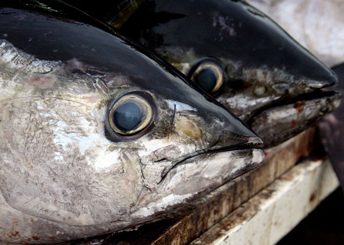 Hawaii’s longline fishermen are back at sea in search of more ahi after extending their quota limit through an agreement with the Commonwealth of the Northern Mariana Islands. The 2016 season had ended early, as it has for the past few years, when the longline fleet in late July hit its 3,554-ton limit for bigeye tuna in the Western and Central Pacific. The deal between Quota Management Inc. President Khang Dang and Northern Marianas Gov. Ralph Torres involves paying the territory $250,000 for 1,000 tons of its 2,000-ton limit. Under the agreement, QMI can assign its rights and obligations to the Hawaii Longline Association, a wholly owned subsidiary of QMI. The association is a nonprofit trade group formed to support the $100 million commercial longline fisheries industry, which includes a fleet of roughly 140 vessels ported in Honolulu. (the author seem to have an axe to grind) Read the story here 09:53
Hawaii’s longline fishermen are back at sea in search of more ahi after extending their quota limit through an agreement with the Commonwealth of the Northern Mariana Islands. The 2016 season had ended early, as it has for the past few years, when the longline fleet in late July hit its 3,554-ton limit for bigeye tuna in the Western and Central Pacific. The deal between Quota Management Inc. President Khang Dang and Northern Marianas Gov. Ralph Torres involves paying the territory $250,000 for 1,000 tons of its 2,000-ton limit. Under the agreement, QMI can assign its rights and obligations to the Hawaii Longline Association, a wholly owned subsidiary of QMI. The association is a nonprofit trade group formed to support the $100 million commercial longline fisheries industry, which includes a fleet of roughly 140 vessels ported in Honolulu. (the author seem to have an axe to grind) Read the story here 09:53
A New England story goes Australian – Fishing industries under pressure
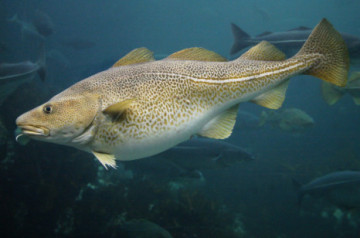 The cod isn’t just a fish to David Goethel. It’s his identity, his ticket to middle class life, his link to a historic industry. “I paid for my education, my wife’s education, my house, my kids’ education; my slice of America was paid for on cod,” said Goethel, a 30-year veteran of waters that once teemed with New England’s signature fish. But on a chilly, windy Saturday in April, after 12 hours out in the Gulf of Maine, he has caught exactly two cod, and he feels far removed from the 1990s, when he could catch 2,000 pounds in a day. The US fishing fleet has dwindled from more than 120,000 vessels in 1996 to about 75,000 today, the Coast Guard says. For the fishermen of the northeastern US – not all of whom accept the scientific consensus on climate change, and many of whom bristle at government regulations stemming from it – whether to stick with fishing, adapt to the changing ocean or leave the business is a constant worry. Robert Bradfield was one of the East Coast’s most endangered species, a Rhode Island lobsterman, until he pulled his traps out of the water for the last time about a decade ago. Read the rest here 09:30
The cod isn’t just a fish to David Goethel. It’s his identity, his ticket to middle class life, his link to a historic industry. “I paid for my education, my wife’s education, my house, my kids’ education; my slice of America was paid for on cod,” said Goethel, a 30-year veteran of waters that once teemed with New England’s signature fish. But on a chilly, windy Saturday in April, after 12 hours out in the Gulf of Maine, he has caught exactly two cod, and he feels far removed from the 1990s, when he could catch 2,000 pounds in a day. The US fishing fleet has dwindled from more than 120,000 vessels in 1996 to about 75,000 today, the Coast Guard says. For the fishermen of the northeastern US – not all of whom accept the scientific consensus on climate change, and many of whom bristle at government regulations stemming from it – whether to stick with fishing, adapt to the changing ocean or leave the business is a constant worry. Robert Bradfield was one of the East Coast’s most endangered species, a Rhode Island lobsterman, until he pulled his traps out of the water for the last time about a decade ago. Read the rest here 09:30
U.S. Coast Guard confirms one missing boater from Middletown has been found safe
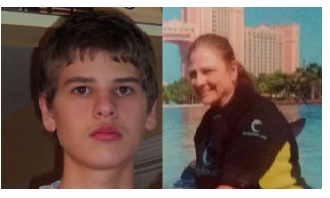 The U.S. Coast Guard has confirmed that one of two Middletown missing boaters has been found alive. Nathan Carman was found Sunday drifting at sea by a freighter. He was in good condition and was coming back to an undisclosed port. There was no information about the whereabouts of his mother, Linda. “Good to go,” Coast Guard representatives said. He was not suffering from life threatening injuries, which is why he’s staying on the freighter. He was found on a four person inflatable life raft that is required safety equipment The family has been notified. Saturday night, friends held a vigil for the Carman’s at Linda’s home. For about a week, the Coast Guard searched roughly 60,000 square miles for Linda Carman and her son Nathan. Read the story here 20:48
The U.S. Coast Guard has confirmed that one of two Middletown missing boaters has been found alive. Nathan Carman was found Sunday drifting at sea by a freighter. He was in good condition and was coming back to an undisclosed port. There was no information about the whereabouts of his mother, Linda. “Good to go,” Coast Guard representatives said. He was not suffering from life threatening injuries, which is why he’s staying on the freighter. He was found on a four person inflatable life raft that is required safety equipment The family has been notified. Saturday night, friends held a vigil for the Carman’s at Linda’s home. For about a week, the Coast Guard searched roughly 60,000 square miles for Linda Carman and her son Nathan. Read the story here 20:48
Ushering industrial aquaculture into the Pacific Islands Region EEZ is anything but sustainable
 Right now, anyone can throw a cage into the open ocean within the Economic Enterprise Zone and begin an aquaculture operation, said Joshua DeMello, of the Western Pacific Regional Fishery Management Council. The beginning of that aquaculture management program for the Pacific Islands Region is in the works, under the eye of the National Oceanic and Atmospheric Administration National Marine Fisheries Service and in conjunction with Western Pacific Regional Fishery Management Council. The entities are preparing a programmatic environmental impact statement (PEIS) analyzing the possible environmental impacts of the proposed management program and alternatives. “The purpose of it is to develop a management program to support sustainable, economically sound aquaculture in the Pacific Island Region,” DeMello said. The PEIS process looks at options for permit duration, whether cages should be metal or net pens, and allowable species. But ushering industrial aquaculture into the EEZ is anything but sustainable, poses a threat to the environment and could impact commercial fishing, according to a biologist. Read the story here 20:13
Right now, anyone can throw a cage into the open ocean within the Economic Enterprise Zone and begin an aquaculture operation, said Joshua DeMello, of the Western Pacific Regional Fishery Management Council. The beginning of that aquaculture management program for the Pacific Islands Region is in the works, under the eye of the National Oceanic and Atmospheric Administration National Marine Fisheries Service and in conjunction with Western Pacific Regional Fishery Management Council. The entities are preparing a programmatic environmental impact statement (PEIS) analyzing the possible environmental impacts of the proposed management program and alternatives. “The purpose of it is to develop a management program to support sustainable, economically sound aquaculture in the Pacific Island Region,” DeMello said. The PEIS process looks at options for permit duration, whether cages should be metal or net pens, and allowable species. But ushering industrial aquaculture into the EEZ is anything but sustainable, poses a threat to the environment and could impact commercial fishing, according to a biologist. Read the story here 20:13
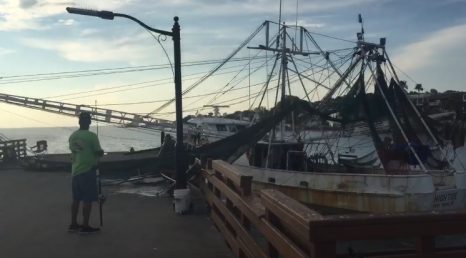
Oops. Shrimp boat raises Holy Hell at the St. Simons Island pier!
A shrimp boat out of South Carolina apparently tried to stop at the St. Simons Island pier late Saturday afternoon to sell shrimp, but the sales pitch didn’t go as planned. The boat is called the High Tide, and was registered out of Hilton Head Island, S.C. The boat got its nets tangled in the railing and caused damage to the western tip of the structure. Shark fisherman Jacob Key said the shrimp boat stopped on the eastern tip of the pier, and the shrimper began handing over buckets of shrimp to a woman he knew on the pier, with plans to sell them to the anglers and sightseers there. But this caused a commotion with the anglers’ fishing lines, and the boat relocated to the south tip of the T-shaped pier. The boat was on the shore side of the pier on the western tip when its net became entangled in a light post. The trawler booms were down and the net and boom tore down several yards of railing, two light posts and a new fish-cleaning table. Read the rest here 18:25
Baseball mourns Miami Marlins ace Jose Fernandez – Killed with two others in boating tragedy
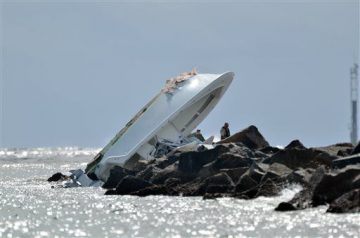 Jose Fernandez escaped from Cuba by boat on his fourth try as a teenager, and when his mother fell into the Yucatan Channel during the journey, he jumped in and pulled her out. Fernandez’s heroic backstory made his death early Sunday that much more heart-wrenching. The charismatic Miami Marlins ace was killed in a boating accident at age 24. Fernandez and two other people died when their 32-foot vessel slammed into a jetty off Miami Beach, authorities said. Authorities didn’t know the time of the crash. The capsized boat was found shortly after 3 a.m. “It does appear that speed was involved due to the impact and the severity of it,” Veloz said. “It does appear to be that they were coming at full speed when they encountered the jetty, and the accident happened.” The boat was owned by a friend of Fernandez. Read the story here 17:46:17
Jose Fernandez escaped from Cuba by boat on his fourth try as a teenager, and when his mother fell into the Yucatan Channel during the journey, he jumped in and pulled her out. Fernandez’s heroic backstory made his death early Sunday that much more heart-wrenching. The charismatic Miami Marlins ace was killed in a boating accident at age 24. Fernandez and two other people died when their 32-foot vessel slammed into a jetty off Miami Beach, authorities said. Authorities didn’t know the time of the crash. The capsized boat was found shortly after 3 a.m. “It does appear that speed was involved due to the impact and the severity of it,” Veloz said. “It does appear to be that they were coming at full speed when they encountered the jetty, and the accident happened.” The boat was owned by a friend of Fernandez. Read the story here 17:46:17
New book explores rise and ongoing value of commercial fishing in Whatcom County
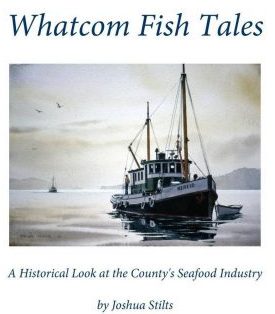 Joshua Stilts grew up in Bellingham the son of a commercial fisher, but never got hooked on fishing himself. Instead, he pursued his interest in journalism. “Telling other people’s stories is what I was passionate about,” said Stilts, who now lives in Seattle. He recently combined his interest in storytelling with his family ties to fishing by writing “Whatcom Fish Tales: A Historical Look at the County’s Seafood Industry.” Stilts described his book as the first overview of the history of commercial fishing in the county for a general audience. His book is more than a personal memoir or a fishing company profile, but less than an academic history on the subject. Read the rest here 17:17
Joshua Stilts grew up in Bellingham the son of a commercial fisher, but never got hooked on fishing himself. Instead, he pursued his interest in journalism. “Telling other people’s stories is what I was passionate about,” said Stilts, who now lives in Seattle. He recently combined his interest in storytelling with his family ties to fishing by writing “Whatcom Fish Tales: A Historical Look at the County’s Seafood Industry.” Stilts described his book as the first overview of the history of commercial fishing in the county for a general audience. His book is more than a personal memoir or a fishing company profile, but less than an academic history on the subject. Read the rest here 17:17
Four New Papers Link Solar Activity, Natural Ocean Cycles To Climate – And Find Warmer Temps During 1700s, 1800s
 As of mid-September, there have already been 77 peer-reviewed scientific papers authored by several hundred scientists linking solar activity to climate change. There were 43 as of the end of June, as seen here. In other words, there have been 34 more papers linking solar forcing to climate change made available online just since July. This publication rate for 2016 is slightly ahead of the pace of published papers linking solar forcing to climate change for 2015 (95 Solar-Climate papers ) and 2014 (93 Solar-Climate papers). At this rate, it is likely that a list of 300+ scientific papers linking solar forcing to climate change will have been made available between 2014 and 2016. In addition, there have already been 41 papers published in science journals this year linking natural oceanic oscillations (i.e., ENSO, NAO, AMO, PDO) to climate changes. There were 27 such papers as of the end of June. The solar-ocean oscillation climate connection has gained widespread acceptance in the scientific community. For example, see “35 New Scientific Publications Confirm Ocean Cycles, Sun Are the Main Climate Drivers” Read the rest here 15:36
As of mid-September, there have already been 77 peer-reviewed scientific papers authored by several hundred scientists linking solar activity to climate change. There were 43 as of the end of June, as seen here. In other words, there have been 34 more papers linking solar forcing to climate change made available online just since July. This publication rate for 2016 is slightly ahead of the pace of published papers linking solar forcing to climate change for 2015 (95 Solar-Climate papers ) and 2014 (93 Solar-Climate papers). At this rate, it is likely that a list of 300+ scientific papers linking solar forcing to climate change will have been made available between 2014 and 2016. In addition, there have already been 41 papers published in science journals this year linking natural oceanic oscillations (i.e., ENSO, NAO, AMO, PDO) to climate changes. There were 27 such papers as of the end of June. The solar-ocean oscillation climate connection has gained widespread acceptance in the scientific community. For example, see “35 New Scientific Publications Confirm Ocean Cycles, Sun Are the Main Climate Drivers” Read the rest here 15:36
Herrera Beutler-backed bill to kill sea lions gains traction
 A measure backed by U.S. Rep. Jaime Herrera Beutler, R-Camas, allowing for the killing of sea lions to protect endangered fish, is gaining momentum in Congress. The Endangered Salmon and Fisheries Predation Prevention Act, co-sponsored by Oregon’s Democratic U.S. Rep. Kurt Schrader, was approved by the U.S. House Natural Resources Committee on Thursday. The bill allows tribal members and fish managers to remove California sea lions from specific areas to protect salmon, steelhead and other native fish that are considered threatened. “Salmon are central to our way of life in the Pacific Northwest, but right now sea lion predation is posing a serious threat to our salmon populations,” Herrera Beutler said in a statement. “Significant resources are invested to ensure their survival, but we’re being poor stewards of these resources if we don’t also manage the threat of an exploding sea lion population.” Read the rest here 14:35
A measure backed by U.S. Rep. Jaime Herrera Beutler, R-Camas, allowing for the killing of sea lions to protect endangered fish, is gaining momentum in Congress. The Endangered Salmon and Fisheries Predation Prevention Act, co-sponsored by Oregon’s Democratic U.S. Rep. Kurt Schrader, was approved by the U.S. House Natural Resources Committee on Thursday. The bill allows tribal members and fish managers to remove California sea lions from specific areas to protect salmon, steelhead and other native fish that are considered threatened. “Salmon are central to our way of life in the Pacific Northwest, but right now sea lion predation is posing a serious threat to our salmon populations,” Herrera Beutler said in a statement. “Significant resources are invested to ensure their survival, but we’re being poor stewards of these resources if we don’t also manage the threat of an exploding sea lion population.” Read the rest here 14:35
Bill to limit presidential powers to designate monuments
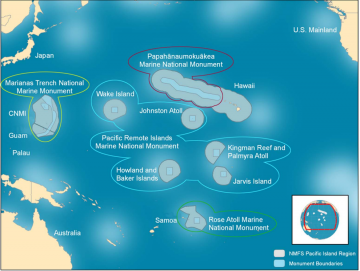 Key US Senators are trying to limit presidential power to designate sweeping national monuments on land and water—an issue that hit home with American Samoa’s fishing industry in the last few years. Senate Energy and Natural Resources Chair Lisa Murkowski and Arizona Senator Jeff Flake have introduced separate bills to curb presidential power under the 1906 Antiquities Act. The law gives the president, sweeping power to designate hundreds of thousands of square miles of ocean and millions of acres of land, as national monuments. President Obama established in 2009, and expanded in 2014, the Pacific Remote Islands Marine National Monument—the largest marine protected area in the world…covering 370,000 square nautical miles, and encompassing important fishing areas for American Samoa’s fishing industry. Read the rest here 13:57
Key US Senators are trying to limit presidential power to designate sweeping national monuments on land and water—an issue that hit home with American Samoa’s fishing industry in the last few years. Senate Energy and Natural Resources Chair Lisa Murkowski and Arizona Senator Jeff Flake have introduced separate bills to curb presidential power under the 1906 Antiquities Act. The law gives the president, sweeping power to designate hundreds of thousands of square miles of ocean and millions of acres of land, as national monuments. President Obama established in 2009, and expanded in 2014, the Pacific Remote Islands Marine National Monument—the largest marine protected area in the world…covering 370,000 square nautical miles, and encompassing important fishing areas for American Samoa’s fishing industry. Read the rest here 13:57
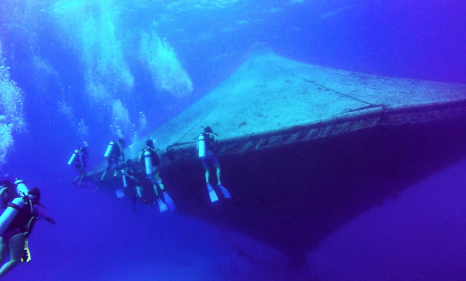
The government wants more offshore fish farms, but no one is biting
Off the coast of San Diego, America’s eighth largest city, commercial fishermen harvest about 1,100 metric tons of seafood from the Pacific every year. That sounds like a lot. But it isn’t much to Don Kent, who says he can do better with just one fish farm. If Kent gets his way, he would raise 5,000 metric tons of yellowtail jack and white sea bass in a grid of net pens measuring about a square mile, anchored four miles off San Diego in federal waters. The species are prized in Southern California sushi restaurants, which now serve their customers imported fish almost exclusively, most of it from China, Japan, Greece or Chile. The US imports about 91% of its seafood. Whether consumers know it or not, about half of that is farmed in aquaculture facilities much like the one Kent wants to build. While the federal government has permitted shellfish farming for years, it didn’t allow farming of finfish such as bass and salmon until earlier this year. Read the story here 10:41






 Attempts to prepare fishers for the share trading program of the NSW fishing industry restructure are a shambles says a local industry representative. Clarence River Fishermen’s Cooperative general manager Danielle Adams, attended a mock or pre-trading share program session in Maclean on Tuesday, where she said it was obvious the NSW Department of Primary Industries was clueless about the direction it was taking the industry. “Most attendees including myself left the session disappointed, angrier, dismayed, some distraught, and with many more questions than when we came,” Ms Adams said. The sessions were part of border-to-border training for fishers to prepare them for the opening of share trading. “The trainer was not from DPI/Fisheries, an obvious ploy to avoid having to answer pertinent questions,” she said. She said the inclusion of mental health line numbers in the DPI’s literature showed the department was aware of impacts it could have. “On seeking further clarification individuals were told to call Beyond Blue or a mental health line,” she said. “Imagine calling the DPI line to gain clarification on your financial future and being told they don’t have the answers but being given a mental health number to call instead – they are aware of the toll this process is taking.
Attempts to prepare fishers for the share trading program of the NSW fishing industry restructure are a shambles says a local industry representative. Clarence River Fishermen’s Cooperative general manager Danielle Adams, attended a mock or pre-trading share program session in Maclean on Tuesday, where she said it was obvious the NSW Department of Primary Industries was clueless about the direction it was taking the industry. “Most attendees including myself left the session disappointed, angrier, dismayed, some distraught, and with many more questions than when we came,” Ms Adams said. The sessions were part of border-to-border training for fishers to prepare them for the opening of share trading. “The trainer was not from DPI/Fisheries, an obvious ploy to avoid having to answer pertinent questions,” she said. She said the inclusion of mental health line numbers in the DPI’s literature showed the department was aware of impacts it could have. “On seeking further clarification individuals were told to call Beyond Blue or a mental health line,” she said. “Imagine calling the DPI line to gain clarification on your financial future and being told they don’t have the answers but being given a mental health number to call instead – they are aware of the toll this process is taking. 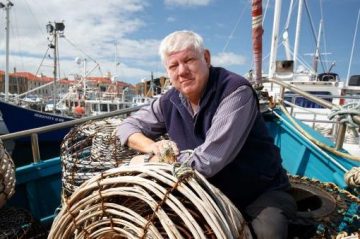 Tasmania’s rock lobster fishermen are a hardy bunch, weathering everything from wild storms to toxic algal blooms, but they have been blindsided by a wave of costly red tape. Third- and fourth-generation rock lobster fishermen who have built an $85 million-a-year trade, mostly via exports to Asia, say new regulations at both state and federal levels threaten chaos. Changes to state regulations proposed from March next year will force rock lobster fishermen to unload their catch in the same area it is caught. While designed to prevent fishermen taking extra lobsters from capped catch areas on their journey home, fishermen say the rule will force them to unload hundreds of kilometres away from their home ports and buyers. Like other fishing industries, they also face massive hikes — up to 116 per cent — in marine safety compliance fees, due to a federal takeover of the role by the Australian Maritime Safety Authority. They believed the state change was a lazy means of making policing easier for fisheries management. “We are not criminals and we shouldn’t be treated like criminals,” said Mr Parker’s brother and fellow rock lobster fisherman, John Parker. A submission by the Tasmanian Rock Lobster Fisherman’s Association describes the state changes as “overly bureaucratic, burdensome and punitive”, as well as unjustified, given there was no evidence of a compliance problem.
Tasmania’s rock lobster fishermen are a hardy bunch, weathering everything from wild storms to toxic algal blooms, but they have been blindsided by a wave of costly red tape. Third- and fourth-generation rock lobster fishermen who have built an $85 million-a-year trade, mostly via exports to Asia, say new regulations at both state and federal levels threaten chaos. Changes to state regulations proposed from March next year will force rock lobster fishermen to unload their catch in the same area it is caught. While designed to prevent fishermen taking extra lobsters from capped catch areas on their journey home, fishermen say the rule will force them to unload hundreds of kilometres away from their home ports and buyers. Like other fishing industries, they also face massive hikes — up to 116 per cent — in marine safety compliance fees, due to a federal takeover of the role by the Australian Maritime Safety Authority. They believed the state change was a lazy means of making policing easier for fisheries management. “We are not criminals and we shouldn’t be treated like criminals,” said Mr Parker’s brother and fellow rock lobster fisherman, John Parker. A submission by the Tasmanian Rock Lobster Fisherman’s Association describes the state changes as “overly bureaucratic, burdensome and punitive”, as well as unjustified, given there was no evidence of a compliance problem. 


























